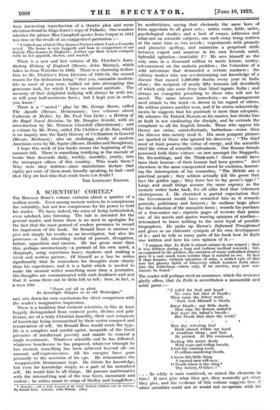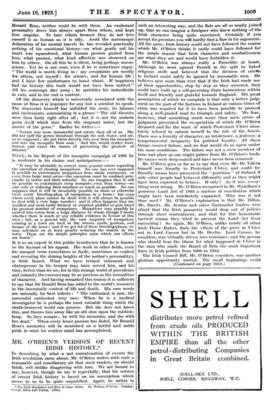A SCIENTIFIC CORTEZ.*
SIR RONALD Ross's volume contains about a quarter of a million words. Even among memoir writers he is conspicuous for volubility, but not less conspicuous for his power to hold his reader. We have, indeed, the sense of being buttonholed, even subdued, into listening. The tale is intended for the general reader, and hence there is no need to apologize for the fact that the most general of readers presumes to record his impression of the book. Sir Ronald Ross is anxious to give not simply his results as an investigator, but also his processes—a full, absorbing recital of pursuit, divagation, failure, opposition and success. He has given more than this, perhaps unconsciously—a portrait of his own mind, a skiagraph, using sometimes heavy shadows and making a vivid and restless picture. Of himself as a boy he writes significantly that he remembers his thoughts more clearly than his experiences, and it is a habit which is needed to make the memoir writer something more than a journalist. His thoughts are communicated with such frankness and zest that it seems there can be little left to tell ; here, in fact, is a man who " Pours out all as plain As downright Shippen or as old Montaigne," and sets down his own conclusions for silent comparison with the reader's imaginative impression.
There is a tradition that eminent scientists, in this at least happily distinguished from eminent poets, divines and poli- ticians, are of a truly Christian humility, their vast conquests of knowledge being overmatched by their vaster conquest and renunciation of self. Sir Ronald Ross would scorn the type. He is a complete and candid egoist, incapable of the timid privacies of intellectual poverty and unable to conceal a single resentment. Whatever scientific end he has followed, whatever beneficence he has proposed, whatever triumph he has secured, something has been achieved beyond all—an unusual self-expressiveness. All his energies have gone primarily to the assertion of his ego. He reincarnates the nsuppressible Renaissance type. He thirsts for knowledge, but even for knowledge simply as a part of his unrealized self. He would fain be all things. He pursues mathematics with the intermitting zeal of the true lover, inconstant and violent ; he writes music to songs of Shelley and Longfellow ;
• Memoirs : with a Full Account of the Great Malaria Problem and its Solution. My Ronald Ross. London : John Murray. Dalai
he, aestheticizes, saying that obviously the same laws of
form appertain to all great arts ; writes verse, fable, satire, psychological studies, and a host of essays, addresses and what-not. on scientific subjects, one such essay being written. at the same time as two novels ; experiments with prosody and phonetic spelling, and maintains a perpetual strife between expert and amateur in his own feverish mind. Splendid agitation—insatiable I ! He sees himself as the only man in a thousand million to waste leisure, money, advancement on the malaria problem ; the Columbus of a wild adventure that demanded a certain madness ; the solitary worker who was revolutionizing our knowledge of a disease that caused 1,300,000 deaths every year in India alone ; the recipient of nearly fifty honours (all described) of which only one came from that blind ingrate India ; and always an evangelist preaching to those who will not be saved. The same intense immodesty—no disparagement need attach to the word—is shown in his regard of others.
He seldom praises another man, and if he utters acknowledg- ments he suggests that his gratitude is more than adequate.
He admires Sir Patrick Manson as his master, but thinks him at fault in not vindicating the disciple, and he extends the complaint to all his English friends. Those who oppose his theory are swine, unintellectuals, barbarians—worse than the thieves who merely steal it. His most pungent phrases are spurted at those who ignored his discovery : " The thief must at least possess the virtue of energy, and the scientific thief the virtue of scientific enthusiasm. Our Roman friends possessed both these virtues—so rare amongst the Sluggards, the Do-nothings, and the Think-nots ! Great would have been their honour—if their honour had been greater." And elsewhere in the same exasperated mood he exclaims, lament- ing the interruption of his researches, " The British are a practical people ; they seldom actually kill the goose that lays the golden eggs ; they force her to lay goose's eggs ! "
Large and small things assume the same urgency as the memoir writer looks back, for all alike feed that vehement obstreperous I. He cherished a partial expectation that the Government would have rewarded him as it rewards generals, politicians and lawyers ; he outlines large plans for the reduction of the mosquito hosts ; records his purchase of a four-seater car ; reprints pages of reviews that praise
one of his novels and quotes warring opinions of another—
determined to leave nothing to the most loyal of possible biographers. He picks up Byron's Deformed Transformed and gives us an elaborate synopsis of his own development of it ; and he tells in many parts of his book how In Exile was written and here his own opinion of it :-
" I suppose that In Exile is almost unique in one respect ; that it was written during a long and tedious medical research ; but, as explained in the preface, the omission of many unfinished stanzas gave it a cast much more sombre than is natural to me. In fact it thus became, without intention of mine, a unified epic of that rare but gloomy Spirit of Discovery which wanders forth alone into the wilderness—where only, if we survive, may new con- tinents be found."
The reader will perhaps need an assurance, which the reviewer gladly offers, that In Exile is nevertheless a memorable and noble poem :— " I eall'd for God and heard
No voice but that of Death ; Then came the bitter word, ' Fool, God Himself is Death.
Great Death ; not little death That nips the flowers unfurl'd And stays the infant's breath ; But Death that slays the world.'
• a
This day relenting God Hath placed within my hand A wondrous thing ; and God Be praised. At His command, Seeking His secret deeds With tears and toiling breath, I find thy cunning seeds, 0 million-murdering Death.
1 laiow this little thing A myriad men will save. 0 Death where is thy sting ?
Thy victory, 0 Grave 1 '
. . . So oddly is man contrived, so mixed the elements in him I If men give what they get, they assuredly get what they give, and the evidence of this volume suggests that if other scientists could not or would not co-operate with Sir
Ronald Ross, neither could he with them. An exuberant personality drove him always apart from others, and kept him singular. To hate others because they do not love oneself is as human as it is silly. Amid the microscopic delineation of his mental travels he has revealed practically nothing of his emotional history—on what gentle soil his heart was squandered, what human passion gushed from him, what passion, what kind affection was showered on him by others. On all this he is silent, being perhaps uncon- scious. Yet he is not sour, even if he is sometimes angry. " The world is worth living in : my complaints are mostly for others, not myself ; for science, and for human life ; and I have few misfortunes to boast about. If happiness had no history this book would not have been indited."
All his contempt dies away ; he sprinkles his imbecilicide in vain, and in the end is content.
Of the discovery which is universally associated with the name of Ross it is improper for any but a scientist to speak. The discoverer himself has unfolded the story, its labours and excitements, summarizing in a phrase " The old theories were then fairly right after all ; but it is not the malaria germ itself which rises from the stagnant water, but the carrier of the germ." Earlier he writes :-
"Nature was more resourceful and astute than all of us. She did not spill the germs broadcast through the soil, water, and air, as we supposed ; she put them directly into man from the mosquito and into the mosquito from man ! And this would render more instant and exact the means of preventing the greatest of diseases."
Wisely, in his Report of the mosquito campaign of 1901 he is moderate in his claims and anticipations :-
" It may be advisable to correct some popular errors regarding the operation of clearing mosquitoes. No one has ever supposed it possible to exterminate mosquitoes from whole continents, or even from large rural areas—the operation must be confined prin- cipally to towns and their suburbs. No one imagines that it will be possible to exterminate every mosquito even from towns—we aim only at reducing their numbers as much as possible. No one supposes that it will be invariably possible to drain or otherwise treat every breeding-place of mosquitoes in a town ; but even where every place cannot be dealt with it will always be possible to deal with a very large number ; and it often happens that the smallest and most easily drained or emptied puddles or pots breed the greatest number of mosquitoes. Mosquitoes may possibly be carried into towns from a large distance by winds, though I doubt whether there is much or any reliable evidence in favour of this view ; but, as a general rule, the vast majority of mosquitoes existing in a town are bred in the streets, yards, gardens, and houses of the town ; and if we get rid of these breeding-places, we may calculate on at least greatly reducing the insects in the town. These are the simple principles upon which our efforts are based."
It is as an expert in this public beneficence that he is known to the layman of his appeal. His work in other fields, even
his unequal verse (sometimes so facile, sometimes so exalted and revealing the shining heights of the author's personality), is little famed. What we have termed vehement and obstreperous in his temper may have served him, and his time, better than we see, for in this strange world of providence and calamity the excesses may be as precious as the normalities of character. And having remarked this truism it is sufficient to say that Sir Ronald Ross has added to the world's resources in the inscrutable contest of life and death. His own words are naturally his test tribute : " The enthusiast is rare, the successful enthusiast very rare. When he is a medical investigator he is perhaps the most valuable thing which the death-bereaved world can possess. But she does not know this, and throws him away like an old shoe upon the rubbish- heap. So they remain ; he with his memories, and she with her dead." When every lesser passion has faded, Sir Ronald Ross's memories will be nourished on a lawful and noble pride in what his restless mind has accomplished.







































 Previous page
Previous page